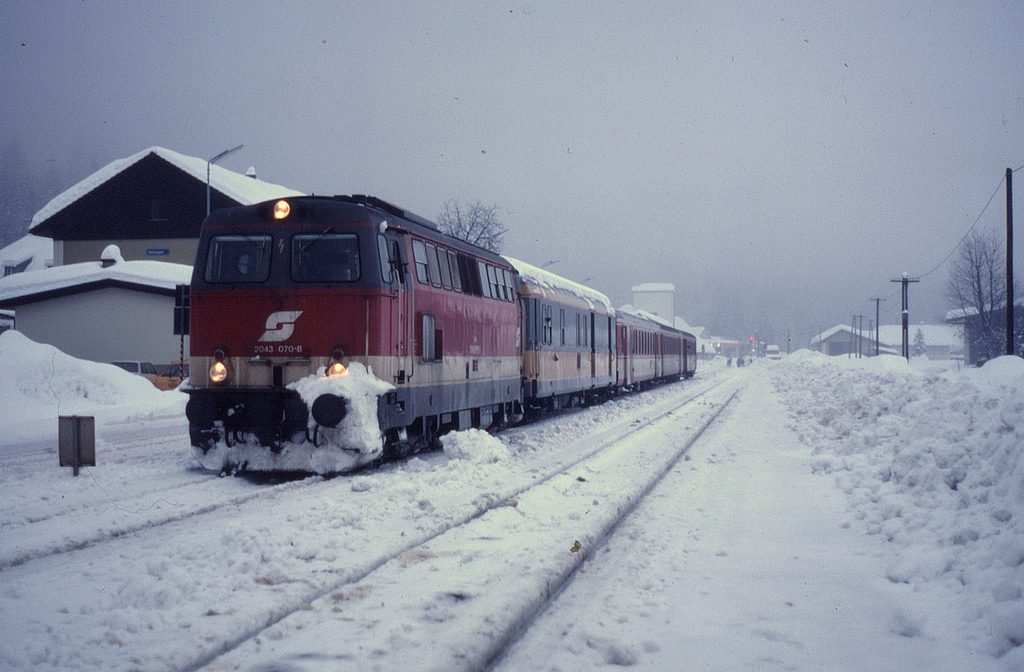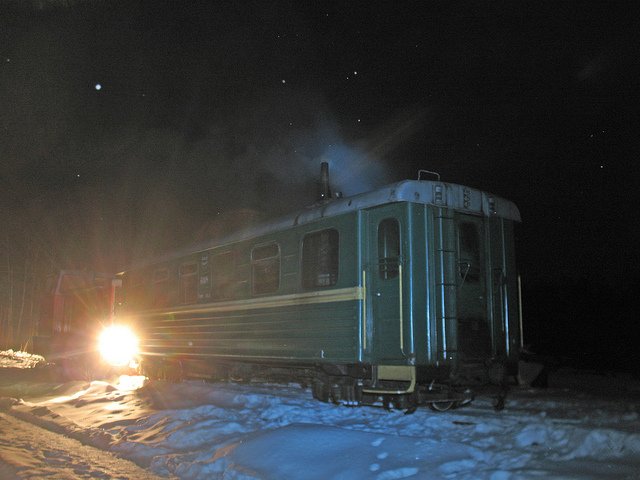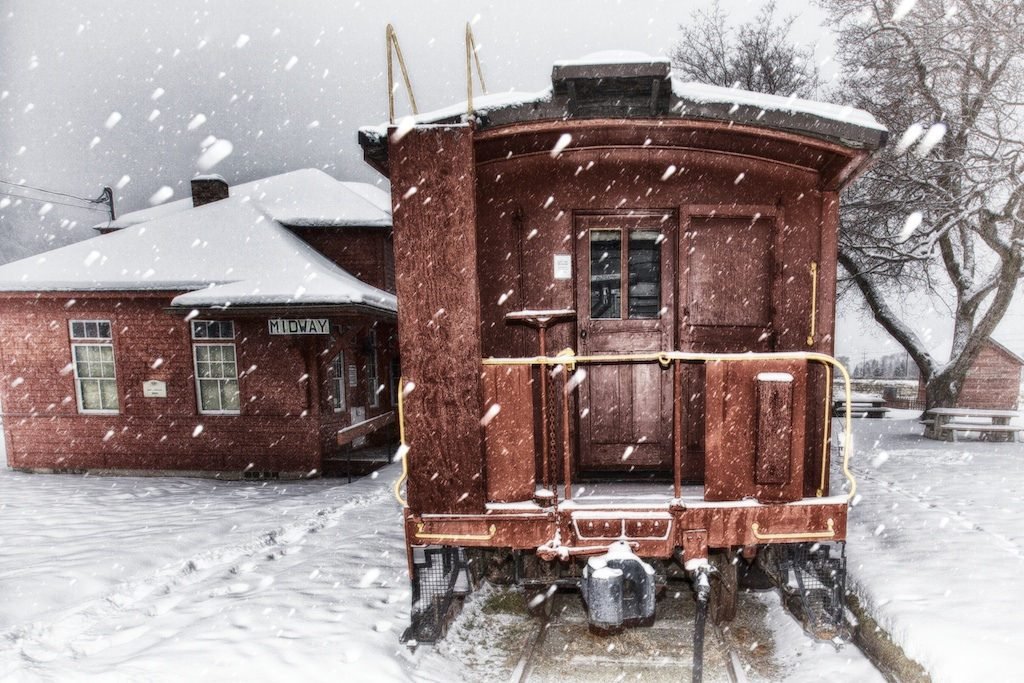In a northern portion of the Midwest, on a night of light snow, during the few minutes just before and after ten o’clock, some things happened. They occurred along a route on which a southbound train traveled through fields that bracketed a town. The train carried few passengers. The conductor sat in the back of a nearly empty car working on a crossword puzzle. He was having trouble thinking of a six-letter word for “spotted, mottled, multi-colored”. He looked outside where the wisps of snow blew sideways in the darkness, but found himself staring at his own reflection in the window: a man of forty whose hair had gone gray as soon as he’d received his discharge from the Army. He pushed his conductor’s cap back on his head and watched a tall, thin man in suspenders limp by towards the dining car behind him. The conductor tapped his foot unconsciously to the rhythm of the train on the tracks and looked outside again. They were passing through the wide, fallow fields. A road in the distance running parallel to the tracks separated the fields, and he saw a light on in a farmhouse at the end of a long drive that met the road, just a tiny square of light in the black night.

The woman in the farmhouse watched the train pass and lit a cigarette. She pulled her terrycloth robe around her. She was standing in her sewing room, which was littered with scraps of material, two types of pedal sewing machines, and romance novels in a cardboard box under an afghan. Her husband was asleep upstairs, and their daughter was away at a religious college. This was the only time she smoked. She cracked the window and waved the smoke outside. She pushed a stray hair behind her ear. The garden they would plant in the spring was turned under across the yard, as it had been every winter for the twenty-six years they had lived there. Once in the summer, she had tried calling as loudly as she could from that garden to her closest neighbor, a Swedish woman who at the time was hanging clothes on the line in her backyard several fields away. It had been a still afternoon, but the woman had given no indication of hearing her.
A little further south, in another farmhouse, a big man rolled over as the train passed. He spooned his wife, who was also large. She sighed in her sleep. As he adjusted himself, the floorboards groaned. He had awakened enough to be aware of the passing train and that the air still smelled of the pork chops they’d fried for dinner. Then he was asleep again, snoring quietly against his wife in his sleeveless T-shirt and boxer shorts and brown socks.
As the train went by a farm closer to town, a few sleepless pigs picked at scraps left in a trough. They were fat, well-fed pigs. They’d come outside from the barn where the rest of the litter lay on top of one another in slumber. These pigs that had padded out into the stiff snow-powdered muck had steam coming off their backs.
At the edge of town, the train passed a small stand of trees where a blanket fell from a fort some boys had made. It had been perched at the entry to the fort that was constructed from sheets of discarded plywood and corrugated scrap iron. Inside, the floor was covered with new straw the boys had stolen from under a tarp in a neighbor’s field. The frigid breeze turned up the corner of the blanket and tossed some straw into the darkness at the back of the fort; it tipped a gray cap that dangled from a nail there and turned up the pages of a comic book that had been left on the straw.
The tracks bordered the town and entered its northern end. The train slowed a bit and passed first a water tower next to the boarded up depot that had closed after the town’s fertilizer plant had been shut down. Next, it passed a church and rectory where a priest prayed. He knelt in the little den he called a chapel and was reciting his nightly litany. The room was dark except for the votive candles he’d lit and used to help him read from his missal. He prayed for the same things he did every night and for a few new items he’d put in the bulletin that week: parishioners who were ill, donations to renovate the social hall, a woman out by the eastern edge of town who had lost her carport to high winds. The room was cold, but he kept the heat down to reduce costs to the parish.
The train passed a cemetery that stood next to the church. Snow had already covered the little mound of earth there that a man had dug up with his fingers when he’d buried a note to his wife at her gravestone that afternoon.
The train ran along the back of the town’s older, business district. It passed an alley behind a family-owned restaurant where a mutt had just knocked over a garbage can. The can landed quietly in the snow loosening its lid. The dog sniffed around the edge of the can until he found some discarded spare ribs. He ate ravenously, chewing on the bones just inside the yellow cone of light from a streetlamp where the alley met the sidewalk.
In a narrow tavern, three men on stools and the bartender all glanced up at the sound of the passing train. The men sat hunched over glasses of beer. On a pedestal over the bar, a television was turned on, but was silent. Earlier, there had been music on the jukebox, but at that moment, it was quiet except for the sound of the train. The ceilings in the bar were high and had unusual, old chandeliers hanging from them that the original owner had won years ago in a poker game in Minneapolis. They threw a weak, smoky light that settled on the bar like dust.
In an apartment over a hardware store, a woman danced as the train passed. She was too clumsy to be part of any performance group. She was dressed in purple tights, and music came from a portable boom box that sat on a chair. A bathroom hand towel was draped around her neck. She had no mirrors, but used the apartment’s windows to watch herself and was pleased at her long, graceful neck and the way she held her fingers above her head.
As the train began passing the older homes that started where the businesses left off, a little girl watched her grandmother sleep. They were sharing her bedroom in one of those homes while her grandmother made her yearly visit from Ohio. As always, the hall light was on and her bedroom door was cracked open. Everyone else in the family was asleep. Her grandmother lay stretched straight out on her back and breathed huskily from her open mouth, which was preventing the girl from sleeping herself. The girl stood next to her grandmother watching the hairs on the old woman’s chin rise and fall with the breathing. She reached out and very gently rubbed her fingers across the hairs. Her grandmother didn’t awaken, but stirred in the sheets that were decorated with moons and stars like her own.
In the dark basement of his parents’ home nearby, a young man with a goatee sitting in front of a computer screen didn’t notice the passing train. He was preoccupied and delighted because he had finally been successful at hacking into data files at John Deere, Inc. He didn’t know what he would find there, but he smiled and raised clenched fists in triumph.
In another of those older homes, a woman and a man had just finished making love. It had been a long time since they’d last been intimate. That had something to do with the woman’s miscarriage. A line of condensation had formed along the perimeter of the bedroom window. They held one another closely and breathed in unison to the passing train.
The train rumbled by close enough to dislodge a gutter on a garage that had grown heavy with accumulated snow. It fell straight down and took a birdhouse with it that had been suspended from a bracket. A feral kitten sauntered over to the birdhouse and licked at its empty opening.

The houses grew a little shabbier as the train continued south along the edge of the town. In one, a baker couldn’t sleep. He listened to the passing train and worried about a recipe he was going to try with cranberries and low yeast in a few short hours. He was concerned that the recipe wouldn’t work because of the cranberries’ moisture content. He wished he would have tried it first on his family. But, it was too late for that because he’d already bragged to many people at the bakery about the unveiling the next morning.
The train passed a small home near the tracks where an older couple lay in twin beds. As it did, they heard a canopy of snow fall from their rooftop at the same moment. They reached out instinctively across a table between their beds strewn with pillboxes, and their fingertips touched.
In another bedroom along those streets, a young woman, full-bodied, heard the passing train as she regarded herself in the mirror on her closet door. She was dressed in the latest costume of her hobby, her fantasy, surrounding the Renaissance: a lady of era-appropriate ill repute. She looked with satisfaction at herself in the muffled red light of the bedside lamp over which her lover, an older woman, had strewn a lacy kerchief. Her lover lay on top of the bedspread in a red dress of the same era with red lipstick and red rouge reading a boating magazine.
In one of the last of those homes before the subdivision began, a forty-five year old high school history teacher lay awake marveling at the prospect of parenthood. In the morning, he would take his sleeping wife, a social worker of the same age, to the hospital for a Cesarean delivery of the child they thought they would never conceive. He caressed the skin on his wife’s upper arm, thick with the weight she’d gained in maternity, and blinked at the thought of how old he’d be when their child finished college. The black wind-up clock on the nightstand next to him ticked.
The train began passing behind the long streets of the subdivision that had been built before the plant closed. In the driveway of one of those homes, another man of nearly the same age sat in an idling car that had already grown too warm with the blowing heater. He had a packed suitcase on the seat next to him and was planning to leave his slumbering wife and daughter. A woman he’d grown to love, a waitress at the bowling alley where he’d bowled twice weekly for many years, was waiting for him to pick her up at her apartment across town. He pictured her sitting in a straight-backed chair at the table in her tiny kitchen looking out the window for him. Her small suitcase would be packed at her feet; she was probably wearing a knit hat. The trouble was that he’d stopped in the doorway of his teenage daughter’s room to blow her a kiss, and he’d stayed too long looking at her thin, pockmarked face that was lit by a clown nightlight he’d given her as a little girl.
In the driveway of another house nearby, a car also sat idling as the train passed. A teenage girl had walked a boy up to the front porch of that house after she’d driven them back from a movie. Before he went inside, they kissed awkwardly. The door closed, and she stood looking at the hanging macramé under the porch light that held a clay pot with no plant.
Along a frozen creek bed that ran between the tracks and the subdivision, a frog had died earlier that night. As the train went by, it had already begun to stiffen on its belly, its legs splayed, in the snow.
In the living room of a house at the far end of the subdivision, a mailman watched a food channel on television as the train passed. He was someone who held a deep interest in stews. The show was about how dow-blat was made in the tea huts of the Himalayan Mountains. He watched with growing fascination as the commentator, who was trekking in the mountains with a small hand-held camera, interviewed Nepalese people about their individual preparations of the lentil paste. The commentator, a young man with a beard and an earring, was on a quest for “the ultimate dow-blat”.
The train accelerated again as it left town and passed the long, darkened fertilizer plant that had been surrounded by chain link fencing since its closure. Inside, within the confines of a loading dock, an elderly homeless man had fashioned living quarters. He lay on a strip of cardboard with his sleeping bag pulled up to his chin. He listened to the train gain speed and thought about the nephew he’d read about in the newspaper, a man he’d babysat for as a boy, who had recently developed a patent for a microchip that would help people find misplaced orthodontia retainers.
Then the fields began again, and the tracks veered back through them and along the highway in the near distance. Dwellings grew further apart. In a long ranch house not far from the plant, a man who had been elected to his first term in the U.S. House of Representatives, was home for a short visit. He sat at the desk in his den sipping whiskey. His wife and son and daughter were asleep in their comfortable rooms. He watched the passing train across the fields of his ranch that was now run by a man who had beaten him in a county wrestling championship in high school. He shook the ice in his glass, and as he did, made up his mind to change his vote on pending gun control legislation. He did so understanding what the consequences would be with his party colleagues and constituents.
A mouse had made a home in a box of old snapshots in the attic of a farmhouse that the train passed a little further along. It was a shoebox of snapshots with white-framed edges from the early 1970s. They were from the photography period of the woman who lived in the house and came before her pottery and meditation periods. They were mostly photos of friends camping, vegetarian bar-b-ques, and feminist gatherings in Chicago when she was in graduate school. She’d forgotten they were there.

Next to a dwindling fire in the river-rock fireplace of a farmhouse several fields away, an old man read a mystery. He wore a green cardigan sweater and had a plaid flannel blanket draped over his knees. The light over his shoulder was directed onto the pages of his book by a tilted brown-paper shade on a stand-up lamp. A fish swam in circles in the oblong bowl on the bookcase next to him. The old man heard the train and smiled. He pulled the blanket further up onto his lap.
Ice had been gathering on a power line over a field that was deep in the recesses of a two hundred acre farm further along and far removed from the tracks. As the train passed and the breeze stiffened, the weight of the line gave way a little, and there was a buzz where the line met the pole. Its rubber covering pulled back a bit under the weight, and the coiled wires became exposed. The wire hissed and swayed in the cold breeze.
The conductor’s foot still tapped to the rhythm of the train. Outside, a small portion of the sky had cleared to the west, and a few Northern Lights there were just visible. The car remained empty until a few minutes later when the door behind him opened and the tall man with the suspenders limped back down the aisle past him. This time, the man’s arm was around a short woman with dishwater-colored hair, a slight hunchback, and thick black-framed glasses. She wore a blouse of pink brocade and maroon stretch pants, and she shuffled with her head bowed while he limped.
The conductor watched them pass through the door at the other end of the car. “Where are you going?” he whispered. “Did you meet on the train or were you together already?”
Suddenly, he knew the word he’d been searching for: calico. He printed it neatly in the boxes of the puzzle. The car was warm. He looked at himself in the window and said, “The world is a calico cat. Everyone has a story, and every story is a good one.”
Other things in other places in the country happened about that same time. A well-respected Boy Scout leader in Seattle walked out of a convenience store with a package of light bulbs concealed beneath his jacket. A businessman sat on his patio in Santa Barbara contemplating investments in eels and deer velvet in Asian markets. A choir director in the Finger Lakes region of New York, a reserved, older woman, turned off the headlights on her car and drove for a while on the wrong side of an empty county road. The mother of a man in Florida called him from Texas and woke him to say that she was losing her eyesight and that she wished she’d taken more pictures.
But in that small northern portion of the Midwest, on that single winter night, just before and after ten o’clock while a train ran along, these things happened. Isn’t that remarkable?

Share this post with your friends.

